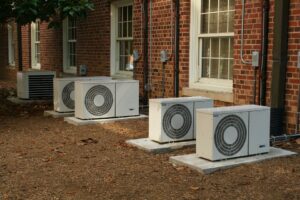
Your air conditioner requires a set amount of refrigerant in order to do its job. This is just a fact. How much refrigerant, the pressure at which the refrigerant should be kept, and the type of refrigerant is going to vary depending on the system you have and some other factors. For instance, R-22 refrigerant was phased out in 2020 and we now regularly use R-410A, which is a lot more environmentally friendly and still works just fine.
What we’re trying to say is, refrigerant is the lifeblood of your system. It’s going to be different depending on the system, but every air conditioner needs it. So when a system starts leaking refrigerant, it’s only a matter of time before your home is too hot, your energy bills spike, and your AC breaks down.
We want to help you avoid the most expensive AC repairs in Harvey, LA. That’s why we’re going to go over some signs you’ll notice when your air conditioner develops a refrigerant leak.
Detecting a Refrigerant Leak
There are a variety of things that can go wrong when you’ve got a refrigerant leak. Your energy bills can skyrocket, your comfort can suffer, and you can ultimately have an AC breakdown that’s expensive to fix. That’s why the earlier you notice a problem, the better. Here are the telltale signs of a refrigerant leak:
- Hissing or bubbling. This noise is very strictly associated with refrigerant leaks. The hissing noise represents gaseous refrigerant escaping from the lines, and the bubbling represents oxygen bubbles that have made their way inside the line of liquid refrigerant. Since refrigerant exists in both gaseous and liquid states within your system, both noises can happen in one air conditioner. Stay vigilant!
- Inefficiency. If your air conditioning bills are on the rise, or you’re experiencing less comfort month after month, your system could be slowly leaking refrigerant. Call us to take a look at the unit.
- Short cycling. Short cycling is a widely used industry term that describes the process of an air conditioner quickly turning on and off for only a few minutes. This can happen when there’s not enough refrigerant in the system and the process is overheating the condenser.
- The smell of refrigerant. Refrigerant is a terrible thing to inhale. While it’s not fatal, it can be pretty damaging to your respiratory system. If you ever notice a sweet, chloroform-like scent coming from one of the refrigerant lines of your air conditioner, then shut the unit off and call us for help when you can.
“Can’t I Just Patch It Myself?”
Nope! While we admire the gusto, patching a refrigerant leak is not simple. Refrigerant needs to be kept at a specific amount in your system, so it needs to be recharged to replace the missing material. Also, refrigerant must be kept at high pressures, so it’s not like patching a plumbing pipe. It’s more akin to a natural gas line, which should never be worked on by a homeowner or layman as well! Let our team help.
Call Natal’s Air Conditioning to have your refrigerant leak patched. Service Honoring the Golden Rule.
